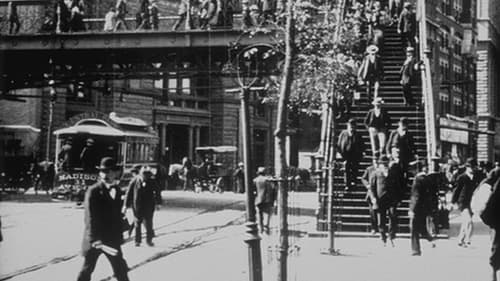Five Film Exercises: Film 1 (1943)
Genre :
Runtime : 5M
Director : John Whitney Sr., James Whitney
Synopsis
Begins with a three beat announcement drawn out in time which thereafter serves as a figure to divide the four sections. Each return of this figure is more condensed, and finally used in reverse to conclude the film.

Two short fragments resulting from experiments in controlling the mechanical development of the instrument.

A subversive experimental short against the ruling class.

A story about the fight for power told with the help of simple graphics. The huge building, the huge column hall, one chair around the chairman's board table is empty. We observe the fight for that chair: little men run and fight, all tricks are allowed.

An animated short film from Stan Vanderbeek.

Pedestrians, carts and trams traffic, on Whitehall Street in New York.

Street scene: Arch de Triumph.

A group of Macedonian women are shown hard at work.

The inauguration of Radio Vaticana, with Pope Pius XI and Guglielmo Marconi.

A parody of Bonnie and Clyde leads into a 'how to drive safely' film. Not to be confused with another 1973 film with the same title.

The 8 minute short is open to interpretation as it examines the inner thoughts of several people around a table, with the Rita Hayworth version of Put the Blame on Mame playing on the soundtrack.

This scene is a part of the very first film shot produced by the Manaki Brothers. Despina, the Janaki and Milton Manaki's grandmother, was recorded weaving in one high-angle shot. For no apparent reason, the first shot made in Macedonia, in the Balkans in fact, made by these two cinematography pioneers, contains peculiar symbolics: at the moment when the grandmother Despina spins the weaving wheel, film starts rolling in our country.

In GLORIA! Frampton juxtaposes nineteenth-century concerns with contemporary forms through the interfacing of a work of early cinema with a videographic display of textual material. These two formal components (the film and the texts) in turn relate to a nineteenth-century figure, Frampton's maternal grandmother, and to a twentieth-century one, her grandson (filmmaker Frampton himself). In attempting to recapture their relationship, GLORIA! becomes a somewhat comic, often touching meditation on death, on memory and on the power of image, music and text to resurrect the past.

New York, travelers descent of the Brooklyn Bridge

The camera pans across a field of flowers at extreme speeds in this short film by Hollis Frampton.

This film uses stop motion animation of still photographs to convey images of politics and science in the nuclear era. The advancement of science allows man to do things he never would have been able to do without, for good or bad. Politicians are either behind the scenes manipulating those scientists or are using that science for their own goals, primarily in the space race. Everyday items and people are projected upwards - many in the form of rockets - followed by iconic structures, such as the Empire State Building, the US Capitol, the Washington Monument, the Eiffel Tower and the Kremlin, being rocketed skyward as visual representations of that race into space.

This two-color (green-blue and red) film was produced as a demonstration reel at the Paragon Studios in Fort Lee, New Jersey, under the direction of Kodak scientist John Capstaff. It features leading actresses, including Mae Murray, Hope Hampton, and Mary Eaton, posing and miming for the camera to showcase the capability of the complex Kodachrome process to capture their translucent movie star complexions and colorful, high-fashion clothing. (loc.gov)

1905 short film showing people walking down a Ljutomer street after mass.

A butchered cow is decapitated in this short film by Hollis Frampton.

Live-action footage of canaries and beachgoers overlaid with hand-painted effects.





